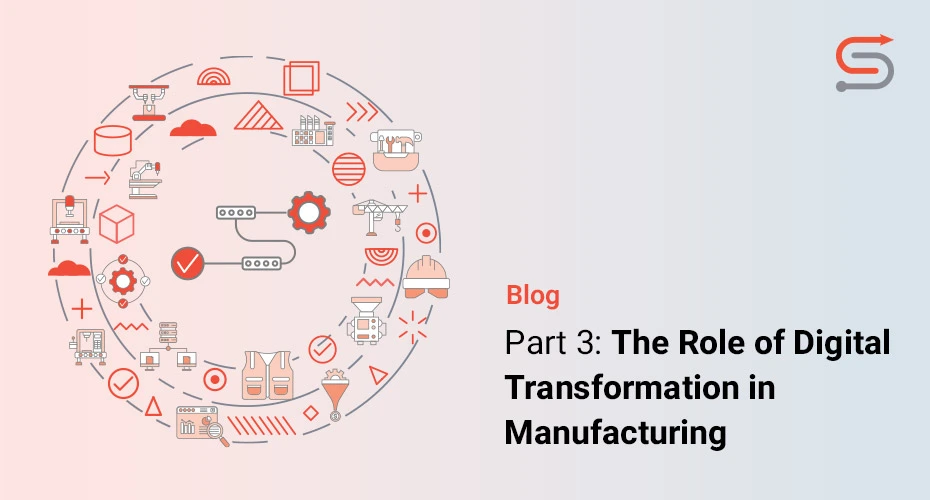Manufacturing organizations are constantly integrating and utilizing digital technologies to optimize various aspects of their operations. This widespread pace of digital transformation is primarily driven by the growing need for increased efficiency, flexibility, and competitiveness in the modern manufacturing landscape.

In this third and last part of our 3-part series, we will shed light on the role of digital transformation in the manufacturing industry.
The Current State of Digital Transformation in the Manufacturing Industry
In the manufacturing ecosystem, machines, people, and processes need to be connected 24/7. Such connectivity enables real-time monitoring, data collection, and analysis, leading to better decision-making and predictive maintenance.
Yet, when it comes to embracing the benefits of modern digital technology, manufacturing organizations come face to face with several roadblocks:
- Cost constraints: Implementing technologies like digital twins or IoT is a costly endeavor for any manufacturing organization. So is the constant monitoring and management of this evolving suite of technologies. Many manufacturers do not have that kind of capital available to sustain their digital transformation efforts.
- Integration hassles: Integrating new digital systems with the existing ecosystem of legacy and proprietary tools is one of the most difficult challenges. Poor integration can paint a limited picture of the manufacturing organization, impacting not just operational efficiency but also business decision-making.
- Cybersecurity concerns: The modern manufacturing organization is extremely wary of the security issues that enterprise-wide transformation will bring about. Without a sound cybersecurity plan in place, there is a high risk of cybersecurity and data breach issues that can put the entire manufacturing business at risk.
- Digital illiteracy: A lot of manufacturers are also limited by their awareness and understanding of modern digital technologies. With limited in-house expertise and restricted budgets, they find it difficult to implement and manage their digitally evolving factory floor.
5 Benefits of Digital Transformation in the Manufacturing Industry
The challenges that come in the way of successful digital transformation can be easily overcome with the right strategy, tools, and resources in place. When done right, digital technology adoption can significantly impact a company’s competitiveness, efficiency, and overall performance. Let’s look at the compelling benefits digital transformation offers to manufacturers, big and small.
1. Operational Efficiency
Digital transformation enables the automation of critical manufacturing processes, reducing manual labor and the risk of errors. This leads to higher productivity and greater operational efficiency.
2. Quality
Real-time monitoring and data analytics help identify and address defects or deviations from quality standards. This allows manufacturers to take timely steps to improve product quality and reduce waste.
3. Flexibility
Digital technologies make it easier for manufacturers to adapt to changing customer demands and market conditions. Based on the latest trends, they can reconfigure production lines and produce products that cater to fluctuations in demand.
4. Inventory Optimization
By using data analytics, manufacturers can get more visibility into their supply chains. Such visibility can enable them to optimize their inventory levels, ensuring that they have the right materials on hand without surpluses or shortages.
5. Predictive Maintenance
IoT sensors and AI-driven analytics can enable manufacturers to predict equipment failures before they happen. This allows for proactive and predictive maintenance, reducing downtime and costly unplanned repairs.
5 Digital Manufacturing Trends
As manufacturing operations get increasingly global, maintaining the right levels of visibility and transparency is the need of the hour. If organizations need to revamp their manufacturing organizations, they must embrace the latest trends and innovations. Here are some digital trends to look for:
1. Industrial Internet of Things (IIoT)
The adoption of IIoT can enable manufacturers to respond to evolving trends and changes at lightning-fast speed. For instance, IIoT can help them minimize the frequency and impact of unplanned downtime arising from equipment breakdowns, labor shortages, and supply chain issues. It can also help optimize schedules, improve visibility, and boost overall equipment effectiveness.
2. Big Data and Analytics
Technology advancements in big data and analytics enable manufacturers to analyze the vast amounts of generated data. The timely analysis of diverse data sets allows them to predict equipment failures, optimize production schedules, and identify opportunities for efficiency improvements.
3. Augmented and Virtual Reality
AR and VR technologies can allow manufacturers to train employees in design and maintenance processes. By enabling technicians to receive real-time guidance, they can facilitate the visualization of complex processes and accelerate the issue resolution process.
4. Advanced Robotics
Using advanced robotics, manufacturing organizations can enjoy a paradigm shift in their operating efficiency levels. Robotics and automated machinery can streamline complex processes, boosting productivity and helping manufacturers streamline their functions.
5. AI and Machine Learning
Manufacturers can embrace AI innovations such as Generative AI and Large Language Models to transform production outcomes. Leveraging these technologies, organizations can identify patterns in processes, understand and organize complex information, and generate human-like interaction.
Driving Digital Transformation in the Manufacturing Industry
As digital transformation transforms operations across industries, the manufacturing sector has a lot to gain. Investing in digital transformation can not only make you better equipped to deal with the current economic environment but also transform your production processes.
However, several digital transformation hurdles need to be addressed and overcome. Engage with a partner today to take on these challenges head-on, maximize your digital transformation ROI, and put your manufacturing organization at the forefront of digital innovation.





